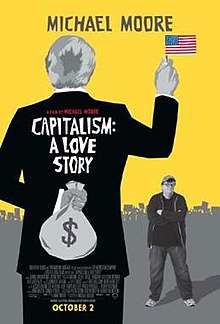Capitalism: A Love Story
| Capitalism: A Love Story | |
|---|---|

Theatrical release poster
|
|
| Directed by | Michael Moore |
| Produced by |
|
| Written by | Michael Moore |
| Music by | Jeff Gibbs |
| Cinematography |
|
| Edited by |
|
|
Production
companies |
|
| Distributed by | Overture Films |
|
Release date
|
|
|
Running time
|
127 minutes |
| Country | United States |
| Language |
|
| Budget | $20 million |
| Box office | $17.4 million |
Capitalism: A Love Story is a 2009 American documentary film directed, written by, and starring Michael Moore. The film centers on the late-2000s financial crisis and the recovery stimulus, while putting forward an indictment of the current economic order in the United States and unfettered capitalism in general. Topics covered include Wall Street's "casino mentality", for-profit prisons, Goldman Sachs' influence in Washington, D.C., the poverty-level wages of many workers, the large wave of home foreclosures, corporate-owned life insurance, and the consequences of "runaway greed". The film also features a religious component where Moore examines whether or not capitalism is a sin and whether Jesus would be a capitalist, in order to shine light on the ideological contradictions among evangelical conservatives who support free market ideals.
The film was widely released to the public in the United States and Canada on October 2, 2009. Reviews were generally positive. It was released on DVD and Blu-ray on March 9, 2010.
Moore begins by looking back at the contradictions in Ancient Rome, drawing similarities with the present day, and wondering how people of the future will look back on American society now. Would they pay more attention to viral videos or the wave of home foreclosures after the late-2000s financial crisis? Moore meets with his friend Wallace Shawn and they discuss what capitalism and "free enterprise" mean. Looking back on his happy and prosperous early life, Moore reflects, "if this was capitalism, I loved it... and so did everyone else": in the 1950s, the top tax rate was 90% and this meant that the country could build dams, bridges, schools and hospitals, most families only had one parent in work, union families had free healthcare, college tuition was free, most people had little personal debt and pensions were guaranteed. This prosperity was driven by the manufacturing industry, which benefited from post-war Germany and Japan struggling to recover.
...
Wikipedia
